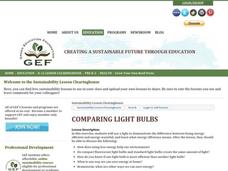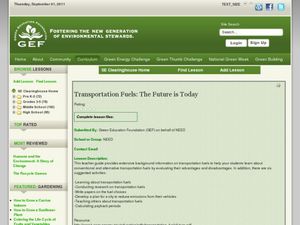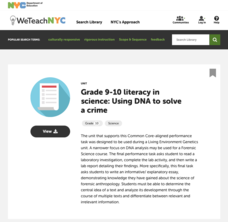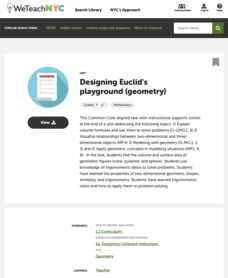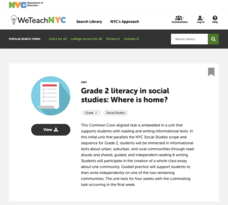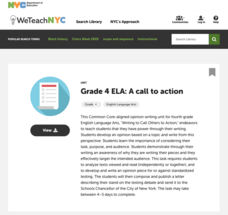Curated OER
Snack Smart!
Students discover healthy snacks. In this healthy snacks lesson, students create a healthy snack. Students sample a simple healthy snack.
Curated OER
Where Is Away?
Students explore garbage. In this landfill lesson, students investigate how much garbage is collected in landfills on average each day. Students discover hazardous materials that are disposed of improperly and the effects of these...
Curated OER
Comparing Light Bulbs
Third graders learn how light bulbs are different and which are more cost efficient. In this energy and efficiency instructional activity, 3rd graders compare the cost of a light bulb and understand that its lifetime is important...
Curated OER
Hazardous Products Substitutes
Third graders write a hazardous products substitutes recipe book. In this Science lesson, 3rd graders identify words and symbols that indicate hazardous substances. Students investigate safe substitutes and write a recipe book to use at...
Curated OER
Draft-O-Meter
Students explore where there are drafts in their homes. In this waste reduction lesson plan, students experiment with a students made draft-o-meter and record drafts on a worksheet.
Curated OER
Hot and Cold Colors
Young scholars experiment with the color and solar energy absorption. In this color and solar energy absorption lesson plan, students spend two days discussing and experimenting with the concept of energy absorption. They paint cans with...
Curated OER
Energy Transfer (Heat)
The pages of this resource are in landscape view and ready-made to use as slides in a presentation on energy transfer in your high school physical science course. Begin with pertinent vocabulary and finish with an explanation of the...
Curated OER
Be Water Wise!
Rally your administration and facilities manager to let your class examine the water flow rates in different areas of the school. After the audit, the class researches opportunites for conserving water and writes a report or develops a...
Curated OER
Mission Possible: Energy Trade-offs
Teams of electrical engineers work together to develop plans for increasing electricity to a fictitious, but growing community. They consider different sources of electricity, both renewable and nonrenewable, the cost of building and...
Curated OER
Stabilization Wedges Game
Teamwork and critical thinking combine to for a creative instructional activity on reducing greenhouse gas emissions. Ebullient environmental studies learners play a game in which they strategize how to place colorful energy wedges...
Curated OER
The Math of Renewable Energy
Students research additional information about questions on their worksheet. In this energy activity, students develop visual aids of their proposed solution to the problem. They present their work in class.
Curated OER
A Matter of Accountability
Pupils conduct a mock trial focusing on environmental accountability of industrialized nations. As an example, they evaluate evidence provided on carbon dioxide emissions. They participate in a mock trial of industrialized nations by the...
Curated OER
Transportation Fuels Debate
Learners study the different transportation fuels. In this energy sources instructional activity students debate the merits of their fuel over others while working together in groups.
Curated OER
The Biofuel Project: Creating Biodiesel
Students research about the processing of biodiesel fuels. In this energy lesson, students produce their own biodiesel using used and new vegetable oil. They discuss the environmental and economic benefits of using biodiesel.
Curated OER
Transportation Fuels: The Future is Today
Assign each group of 3-4 upper elementary engineers to a different type of transportation fuel. A background information page is provided to get them started with researching their assigned fuel. Each group then produces an exhibit...
New York City Department of Education
Straw Rockets
Scholars become rocket scientists as they take off on a journey exploring Newton's laws of motion. After learning the laws of motion, pupils design their own investigations using straw rockets. They highlight their literacy skills in a...
New York City Department of Education
Grade 9-10 Literacy in Science: Using DNA to Solve a Crime
Scholars become detectives and use science to solve a crime! A complete unit introduces DNA and includes hands-on activities that have learners model DNA and extract it from different food types. A culminating activity challenges...
New York City Department of Education
Isabella’s Garden
Create rows and rows of vegetables. Pupils use their knowledge of multiplication to find the number of vegetable shoots planted in a garden and ways to arrange the vegetables in the performance task. Teachers use the suggested unit...
New York City Department of Education
Designing Euclid’s Playground
Create a geometric playground. Pupils work through a performance task to demonstrate their ability to use geometric concepts to solve everyday problems. The accompanying engineering design lessons show teachers how the assessment works...
New York City Department of Education
Grade 11 Literacy in Social Studies: Research Paper
The lesson guides young academics through the steps in producing a 10-page research paper on any topic in American history. Historians begin by formulating a thesis and gathering resources, then move on to creating an outline, and end...
New York City Department of Education
Grade 2 Literacy in Social Studies: Where Is Home?
What makes a community? How communities differ? Young scholars research different types of communities, small rural towns, and large crowded cities. They respond to writing prompts, and write essays in groups to understand the wide...
New York City Department of Education
Grade 4 Literacy in English Language Arts: A Call to Action
You have the power! Scholars learn that they have power of the pen in their writing. After reading and viewing various sources about standardized testing, they express their own opinions about the testing by writing letters to the...
New York City Department of Education
Grade 5 Literacy in English Language Arts: Should the School Day Be Longer?
Scholars read newspaper articles relating to a longer school day and complete note-taking organizers as they read. They then form opinions and complete outlines before writing essays supporting their point of view.
New York City Department of Education
Grade 5 Literacy: TCRWP Nonfiction Reading and Opinion/Argument Writing
Choose a side! Pupils watch and read several nonfiction resources about zoos. After gathering their research, they choose a side either for or against closing zoos. Scholars complete KWL charts, anticipation guides, flow charts, and...




